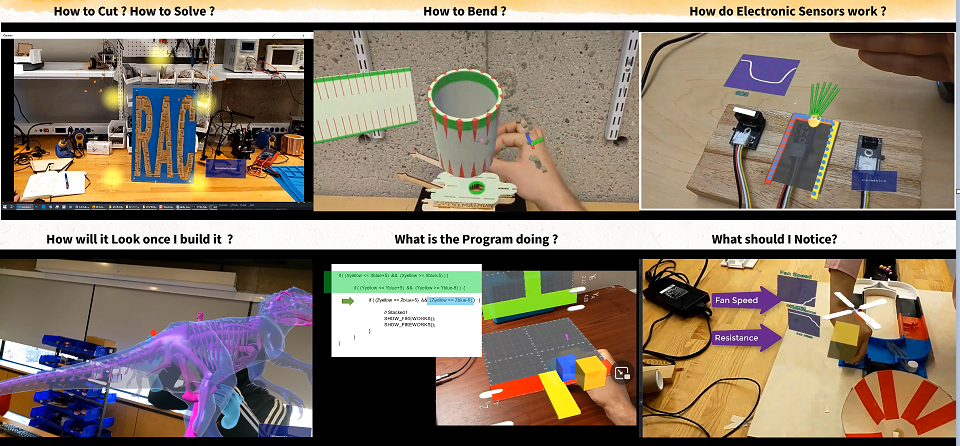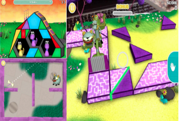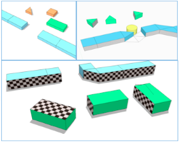|
Co-Designing the Future Augmented Reality Maker Spaces |
|||
|
Purpose: Research Project Lead, Lead Software Developer, Lead UX Researcher
Development: Topics: augmented-reality codesign creativity authoring tools electronics internet of things |
|
This project is a co-creation activity where we work with students in a makerspace class, to co-create / co-design prototypes and explore the future of augmented reality for maker spaces. Every week during the spring 2022 course, my team and I (augmented reality technology engineers and educational researchers) worked with students (graduate students at Harvard Graduate School of Education) to imagine what the future of AR-enhanced makerspaces would look like, and we built prototypes to explore that future. It was a co-design process where the students had a voice to shape the future learning technology, by brainstorming ideas for the future, reflecting on how augmented reality technology can help learning in makerspaces, then my team built those ideas into working prototypes, which we showed to other students and gathered feedback on their educational impact. As part of this process we created a Unity3D open-source middleware authoring platform, that can be used to more easily create multi-user augmented reality experiences tied to physical objects. It was a really wonderful process of co-designing the future, by creating rapid collaborations between people of different backgrounds and different roles. We generated (1) a list of opportunities for AR in future makerspaces, (2) a set of guidelines for integrating AR into makerspaces, and (3) an understanding of impacts on the co-designer students.
Publications Radu, I., Yuan, J., Huang, X., & Schneider, B. (2023). Charting opportunities and guidelines for augmented reality in makerspaces through prototyping and co-design research. Computers & Education: X Reality, 2, 100008. (PDF) Prototype Images: Videos: Codesign Exploration Prototypes [LINK] Video: Software Features
|
|
|
PBS KIDS Cyberchase Shape Quest: Using Augmented Reality for Elementary-School Mathematics Education |
|
|||||||
|
Purpose: Contract Work Team: 5 organizations and Lead Game Designer Development: Topics: augmented-reality children cognition education interaction techniques user studies |
|
I directed the design, research, and overall production of this educational augmented-reality app which contains 3 games. Help your animal friends return to their homes in this AR game, which uses a tablet’s camera to combine the real world with digital content. Travel through 5 different environments and apply spatial memory, visualization and modeling skills, while investigating, predicting, putting together and taking apart two- and three-dimensional shapes. But this isn’t a game to play just sitting on your couch! By using the camera on your tablet, plus the “AR” technology, you can play while moving your whole body around the gameboard. (Accolades: 500k+ downloads; Top 10 Educational Apps on iTunes Store; Webby Award 2014 Finalist, 2015 Honoree; iKids Award 2015 Finalist) Official Homepage : PBS KIDS Cyberchase Shape Quest Video: Cyber Chase Shape Quest video from user Julie on Vimeo Publications :
Images :   |
|
|||||
|
Holographic Objects: An AR Electronics Toolkit for Sensing and Programming |
|||
|
Purpose: Postdoctoral Research Lead Researcher / Designer Development: Topics: augmented-reality electronics cognition interaction techniques mixed methods user studies |
|
This project is also part of the NSF Making with Understanding grant, which explores how a new generation of maker spaces can be enhanced by augmented reality technologies. In this work we are developing electronic sensors integrated with augmented reality visualizations, in order to allow novice programmers to more easily understand and debug electronic systems that integrate spatially-distributed sensors and actuators. This work involves user research studies, and hardware and software development (C++, C#, Unity3D, Hololens, Arduino, Raspberry Pi). 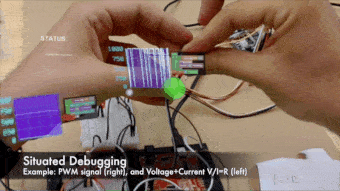 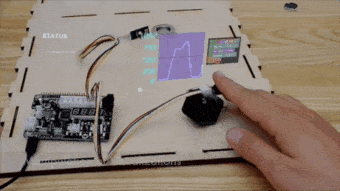 Presentation: Circuit Tools Presentation: Robot Tools
Radu, I., Hv, V., & Schneider, B. (2021). Unequal Impacts of Augmented Reality on Peer Collaborative Learning during Robot Programming. In Proceedings of the international conference on Computer-Supported Collaborative Work. Radu, I., Vanderlee, C., & Schneider, B. (2020). The Augmented Reality Holoboard and Holopen: Electronic Circuit Debugging Tools. In Proceedings of FabLearn 2020. Radu, I., Vanderlee, C., & Schneider, B. (2020). Understanding Augmented Reality Tools in Maker Spaces. International Conference of the Learning Sciences.
|
|
